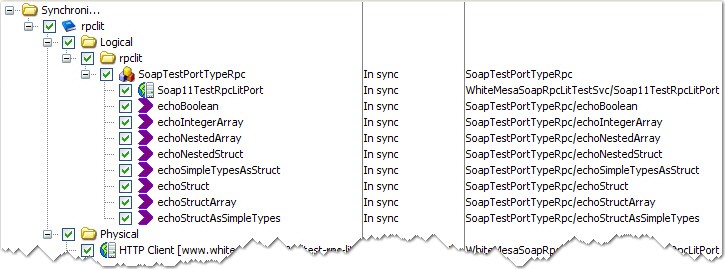Add a resource
You
can add an external resource to the project by selecting it from a
specific collection in the toolbar (General, TIBCO, Web, or webMethods)
or by clicking the Add New Item button  .
.
If you select a specific resource, an appropriate wizard is launched to guide you through the import. If you select the Add New Item option, you must select the resource type to add before the appropriate wizard is launched.
Depending on the version of Rational® Integration Tester that you are using, the following components can be added as an external (synchronized) resource to your IBM® Rational Integration Tester project:
- A webMethods Integration Server Domain (see Testing Software AG webMethods)
- An IBM WebSphere® Application Server (Working with WebSphere Application Server)
- A WSDL document (see Adding a WSDL document as a synchronization source)
- An IBM Integration Bus (see Working with WebSphere Message Broker)
- A TIBCO BusinessWorks Project or Design Time Library (see Testing TIBCO applications)
- A WADL document (see Adding a WADL document as a synchronization source)
- An SAP System (see Testing SAP applications)
- An SCA Domain (see Testing Oracle Fusion)
View resources
After one or more resources is added to the project, they are displayed in the Synchronization view, as shown:
The synchronization view displays the following information about added resources:
| Path | Displays the test artifacts that were generated for the resource in the same structure that exists in the original resource. |
| Status | Indicates the status of the selected artifact, as follows: No local copy exists: No local artifacts were created. In sync: A local artifact was and it is in sync with the external resource. Source copy updated: The external source was updated since the last synchronization, so the unedited local copy could be out of date. Local copy updated: The local copy of the artifact was modified since the resource was added. Source and local copies updated: Both the local copy of the resource and its source were modified since the resource was added. Source copy no longer exists: The selected artifact was deleted from the synchronization source (for example, from the BusinessWorks project) but still exists in the Rational Integration Tester project. Unknown state: The status of the artifact cannot be determined. |
| Source | The full path in the external resource from which the artifact originated. |
Check synchronization
Once you add an external resource, or change the local
project, you can check synchronization to update the status of the
resource’s local artifacts. To check synchronization, click the Check
Synchronisation button  in the toolbar.
in the toolbar.
Select artifacts for synchronization
After you add a resource to your project, all of the generated artifacts are enabled (selected) for synchronization by default. If wanted, though, you can disable any number of artifacts by clearing their node in the synchronization tree.
- To enable/disable an artifact for synchronization,
tick/untick the check box next to the artifact name. Note: Selecting or clearing the root of the resource or any subtree selects or clears all artifacts within the same branch of the tree.
- To enable/disable all artifacts for synchronization, right-click any node in the tree and select Select All Paths/Deselect All Paths from the menu.
Expand and collapse artifacts
The artifacts that are generated by adding an external resource to your project are organized in a tree structure. The entire tree or any one or more branches within it can be expanded or collapsed.
- To collapse the selected branch and all branches
below it, click the Collapse All button
 .
. - To expand the selected branch and all branches
below it, click the Expand All button
 .
.
Resolve artifacts
If changes are made to both the local copy and source of a test artifact, the changes can be resolved to indicate that you are satisfied that the versions of the local copy and source are current and accurate.
For example, if you edit a BW transport in Rational Integration Tester and edit the same transport in the BW project, the local copy is merged following synchronization. To "approve" the change, right-click the artifact and select Mark as resolved from the menu.
Synchronize resources
When you are ready to synchronize your project with
external resources, click the Synchronize button  in the toolbar. Rational Integration Tester scans
the external resources and create all of the test artifacts that you
need to successfully test the resource.
in the toolbar. Rational Integration Tester scans
the external resources and create all of the test artifacts that you
need to successfully test the resource.
